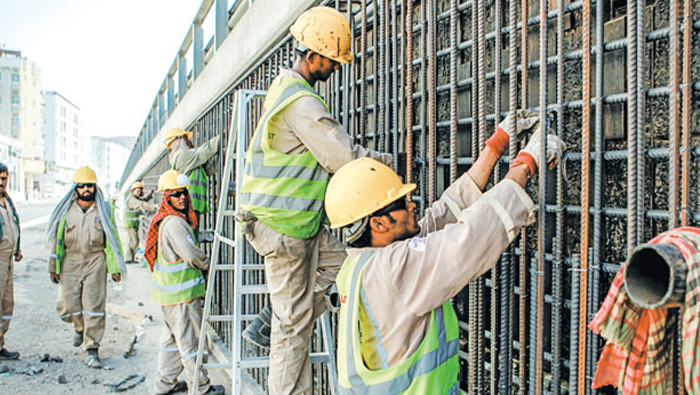
Muscat: Indian expatriate deaths in Oman over the last five years are among the lowest from the six GCC nations, new data from the Indian government has revealed.
Nearly six times more Indians died in Saudi Arabia as compared to Oman, where 2,564 Indian nationals who lived and worked in the country passed away between 2014 and 2018, revealed VK Singh, India’s External Affairs Minister, when he was asked how many Indians living in the Gulf countries had lost their lives, during a session of the Lok Sabha, the Indian government’s lower house.
In total, 28,523 Indian workers died in the six GCC nations over the last five years. Saudi Arabia recorded the highest number of deaths, with 12,828, followed by the United Arab Emirates (7,877), Kuwait (2,932), Oman (2,564), Qatar (1,301), and finally, Bahrain (1,021).
The data on Indian worker deaths in the six nations – Oman, the UAE, Saudi Arabia, Bahrain, Kuwait and Qatar – was sent to the government by the Indian missions in these countries, and India’s embassy in Oman said that it was working closely with the Oman government to reduce this number.
“The Embassy of India, Muscat, works closely with the authorities concerned in the government of Oman to address all issues relating to the welfare of the Indian diaspora in Oman, including Indian workers,” said a senior official of the embassy to the Times of Oman.
Welfare services
“In cases of death and accidents as well, the Embassy provides welfare services and support to the families of the deceased and/or victims, in coordination with the authorities concerned.”
Social welfare authorities said that the number of Indian worker deaths in the country was reducing. Some 519 Indian expats died in 2014, 520 in 2015, and 547 in 2016, before dipping slightly to 495 in 2017, and 483 in 2018.
“The deaths were actually a little less this year,” said PM Jabir, Community Welfare Secretary, Indian Social Club.
“This is well under control, because there is also a number of natural deaths that take place in the country, so we cannot help that. A number of these are also due to road accidents. Most of the concerns are due to the non-payment of wages. We address these regularly and the embassy and Ministry of Manpower are very helpful.”
“My team and I take these workers to the embassy, which in turn helps them file a case at the Ministry of Manpower,” he added. “We cannot help some of these deaths because a significant number of them are natural. Workers need to protect themselves by insuring themselves, if the sponsors are not helpful. We get many requests for medical insurance, because many workers are unable to take care of themselves.”
The Indian Embassy in Oman also has a number of rules in place to protect migrant workers to Oman, many of whom are blue-collar workers who perform manual labour for companies. Every Indian worker who comes to Oman has to submit a number of documents for Indian officials to verify, including a copy of the passport of the person recruited, a commercial registration copy of the sponsoring company, authorised signatures of the company, labour clearances from the Ministry of Manpower in Oman, and the original visa along with two copies.
The employment agreement, in both English and Arabic, must also be attested by the Ministry of Manpower and India’s Ministry of External Affairs. In addition, Indian missions across the GCC have also issued changes to the service agreements for housemaids, which have been in effect since 2011. The embassy has said that the changes are aimed at protecting the housemaids from abuse.
A number of other schemes have also been put in place to ensure that recruitment of Indian manpower is done properly. Agencies that wish to recruit
Indian workers can only do so once their requisition forms are attested by the embassy, while hotlines are also available for workers who wish to raise labour concerns. The embassy also holds open houses where migrant workers can discuss pressing issues.
Under Omani law, should an expat die in the country, the sponsor of the employee is responsible for coordination with the embassy to ensure the body is repatriated accordingly.
The Indian Ministry of External Affairs has also set up its madad (Hindi for “help”) portal to register complaints directly with the government, in keeping with the International Labour Organisation’s Declaration of Fundamental Principles and Rights at Work. Adopted in 1998, the declaration ensures member states respect and promote principles and rights in four categories, whether or not they have ratified the relevant conventions.
These categories are: freedom of association and the effective recognition of the right to collective bargaining, the elimination of forced or compulsory labour, the abolition of child labour, and the elimination of discrimination in respect of employment and occupation.
“Social dialogue at the national level is instrumental in developing normative and policy frameworks that offer protection to all young workers; at the same time, adequate practices, supervision, and monitoring and evaluation systems must be in place for the relevant norms to be effectively applied and monitored,” said Corinne Vargha, Director of the International Labour Standards Department of the ILO, and Azita Awad, Director of the Employment Policy Department.
According to data from the NCSI, there are 664,227 Indian expatriate workers in Oman, making them the highest overseas community in the country. Of them, 48,115 are women, and 616,112 are men.
The Indian embassy’s labour complaint hotline can be reached at 24695981 or 92769735. A toll-free helpline has also been set up, on 80071234.